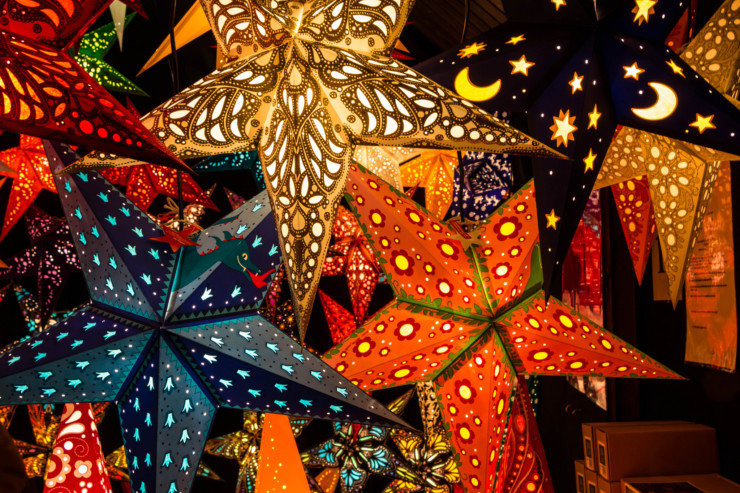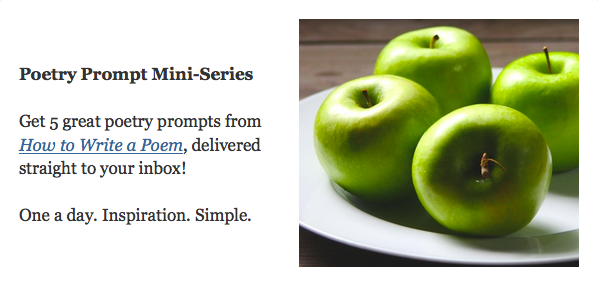
Prompt Guidelines and Options
1. Speak in the first person.
2. Be specific. Think nouns instead of adjectives.
3. Consider where you—a star—are located, or where you came from (a star is born!), or where you are going (next stop, supermassive black hole!). Or, speak as if you have a special desire or concern: maybe you are hungry, missing something, afraid of a sight or sound, in love with another star that is like you or not like you (perhaps a fiery, yet brief romance with a falling star). Be creative. Any type of situation is fair game.
4. Consider doing a little research about the star you will speak as: folklore, history, constellations, associated words, music, art, sculpture, architecture, fashion, science, and so on. Look for unusual details, so you can speak convincingly and intriguingly about yourself.
That’s it! We look forward to hearing you speak poetically, from the viewpoint of a star.
Click to get FREE 5-Prompt Mini-Series
Featured Poem
Thanks to everyone who participated in last week’s poetry prompt. Here is a poem from Rick we enjoyed:
Fire Hides In the Quiet Air
Maybe time will tell
that all we’ve imagined is true
for earth and heaven.
The sunlight dying in the distance
is neither here nor there as it turns
with our desires to see what seeing means.
In the wild grass the sun burnishes
the earth, makes spots of gold
that for hopeful breaths sustain
and float like rain clouds holding rain.
I believe in the field of stars,
rising from unseen milky stems—
delicately masked flowers, flakes
shaken from the Diamond Frost
on the hillside and scattered
like wishes deep into the night sky.
It is a wild heaven that awaits us,
filled with dust aloft in the light,
like dandelion seed?
Fire hides in the quiet air—
the proof rises from the summer moons
in the pale lawns of your childhood.
In jars filled with grass and fireflies—
recall the seasons their spell held you,
keep them safe in this world of words.
—by Rick Maxson
Photo by sudoaptgetupdate. Creative Commons via Flickr.
Browse more writing prompts
Browse poetry teaching resources
Browse more Wishes & Stars poems

“How to Write a Poem is a classroom must-have.”
—Callie Feyen, English Teacher, Maryland
- Poetry Prompt: Misunderstood Lion - March 19, 2018
- Animate: Lions & Lambs Poetry Prompt - March 12, 2018
- Poetry Prompt: Behind the Velvet Rope - February 26, 2018

Rick Maxson says
Chandrasekhar Limit
The Chandrasekhar limit, a theory advanced by Subrahmanyan Chandrasekhar, is ascribed to a star with the maximum mass a white dwarf star can be without eventually exploding
in the blinding flash of a super nova.
Perhaps I shine brightest now,
but my energy has changed;
what I know is difficult to know
in simple space and time;
passion is a system dying,
if not making new.
Precious is a luxury,
a jewel with maintenance.
I am a white dwarf, long in the truth
of life and death, weighted with mission
that follows me like a shadow,
a penumbra I must now leave behind.
This is the way of creation, nothing
begets nothing. Darkness moves me
into the light.
Heather Eure says
You had me at Chandrasekhar, Rick. Electron degeneration, Planck mass, and stuff… wonderful to consider, even better when it’s written in poetry. 🙂
Rick Maxson says
Thanks, Heather.
Supernovas complete me. 🙂
Katie says
Circus
of stars collide
mesmerizing, brilliant
Kaleidoscope twirling above,
Stunning!
ALSO:
captivating stars
hanging aloft, spinning ’round
kaleidoscopic
I was so enchanted by the image at the top of this prompt. It reminded me of the type of things I’ve seen from Cirque d’ Soleil.
And then I recalled that we have a NASA calendar that has photos from the Hubble Space Telescope. When I took some time to look through its images and read some of the captions, I was just fascinated with the immensity of space and spellbound by the complexity of stars, moons, and other planets.
From looking at the NASA images I feel I have a new and deeper/higher ? – appreciation of the universe and want to share my favorite Psalm with you to honor the Creator:
PSALM 8
LORD, our Lord,
how majestic is your name in all the earth!
You have set your glory in the heavens.
Through the praise of children and infants
you have established a stronghold against your enemies,
to silence the foe and the avenger.
When I consider your heavens,
the work of your fingers,
the moon and the stars,
which you have set in place,
what is mankind that you care for them?
You have made them a little lower than the angels
and crowned them with glory and honor.
You made them rulers over the works of your hands;
you put everything under their feet:
all flocks and herds,
and the animals of the wild,
the birds in the sky,
and the fish in the sea,
all that swim the paths of the seas.
LORD, our Lord,
how majestic is your name in all the earth!
Heather Eure says
Wonderful to consider those lofty things, isn’t it? Poetry written about our “kaleidoscopic” cosmos helps encourage a sense of awe-struck wonder.
Katie says
Yes, and thank you, Heather:)